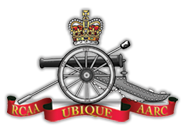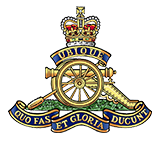Commonwealth Meritorious Recognition
The purpose of this page is to record the Commonwealth recognition of exceptional service rendered by members of The Royal Regiment of Canadian Artillery. Omissions or errors should be brought to the attention of RHQ RCA and the RCA Association Secretary for correction.
Most Distinguished Order of St Michael and St George
The Most Distinguished Order of St Michael and St George is a British order of chivalry founded on 28 April 1818 by George IV, Prince of Wales, while he was acting as prince regent for his father, King George III. It is named in honour of two military saints, Michael and George.
Recipients of the Most Distinguished Order of St Michael and St George
Most Honourable Order of the Bath
The Most Honourable Order of the Bath is a British order of chivalry founded by George I on 18 May 1725. The name derives from the elaborate medieval ceremony for appointing a knight, which involved bathing (as a symbol of purification) as one of its elements. The knights so created were known as “Knights of the Bath”
Recipients of The Most Honourable Order of the Bath
Most Excellent Order of the British Empire
The Most Excellent Order of the British Empire is a British order of chivalry, rewarding contributions to the arts and sciences, work with charitable and welfare organisations, and public service outside the civil service. It was established on 4 June 1917 by King George V and comprises five classes across both civil and military divisions, the most senior two of which make the recipient either a knight if male or dame if female.
Recipients of The Most Excellent Order of the British Empire
Order of the Companions of Honour
The Order of the Companions of Honour is an order of the Commonwealth realms. It was founded on 4 June 1917 by King George V as a reward for outstanding achievements. It was founded on the same date as the Order of the British Empire. The order was originally intended to be conferred upon a limited number of persons for whom this special distinction seemed to be the most appropriate form of recognition, constituting an honour disassociated either from the acceptance of title or the classification of merit. It is now described as being awarded for having a major contribution to the arts, science, medicine, or government lasting over a long period of time.
Recipients of the Order of the Companions of Honour
Distinguished Service Order
The Distinguished Service Order (post-nominals: DSO) was a a military order for officers only, and while normally given for service under fire or under conditions equivalent to service in actual combat with the enemy, it was awarded between 1914 and 1916 under circumstances which could not be regarded as under fire. The order was generally given to officers in command, above the rank of Lieutenant-Colonel and awards to ranks below this are usually for a high degree of gallantry just short of deserving the Victoria Cross.
Recipients of the Distinguished Service Order
Military Cross
The Military Cross (post-nominals: MC) was awarded to Commissioned Officers of the substantive rank of Captain or below or Warrant Officers for distinguished and commendable services in battle.
Recipients of the Military Cross
Distinguished Flying Cross
The Distinguished Flying Cross (post-nominals: DFC) is awarded to officers and Warrant Officers for an act or acts of valour, courage or devotion to duty performed whilst flying in active operations against the enemy.
Recipients of the Distinguished Flying Cross
Air Force Cross
The Air Force Cross (post-nominals: AFC) is a military decoration awarded to officers for “an act or acts of exemplary gallantry while flying, though not in active operations against the enemy”.
Recipients of the Air Force Cross
George Medal
The George Medal (post-nominals: GM) was established on 24 September 1940. It was awarded only for acts of great bravery and was intended primarily for civilians. Awards to the military were confined to actions for which purely military honours were not normally granted.
Recipients of the George Medal
Distinguished Conduct Medal
The Distinguished Conduct Medal (post-nominals: DCM) was awarded to Warrant Officers, non-commissioned officers, and non-commissioned members, serving in any of the sovereign’s military forces, for distinguished conduct in the field. It was the second highest award for gallantry in action (after the Victoria Cross) for all army ranks below commissioned officers and was available to Navy and Air Force personnel also for distinguished conduct in the field.
Recipients of the Distinguished Conduct Medal
Military Medal
The Military Medal (post-nominals: MM) was awarded to Warrant Officers, Non-commissioned Officers and non-commissioned members for individual or associated acts of bravery on the recommendation of a Commander-in-Chief in the field.
Recipients of the Military Medal
Meritorious Service Medal
The Meritorious Service Medal (post-nominals: MSM) was awarded to Commonwealth all ranks that were recommended gallant conduct in the performance of military duty otherwise than in action against the enemy, or in saving, or attempting to save the life of an officer or soldier, or for devotion to duty in a theatre of war.
Recipients of the Meritorious Service Medal
British Empire Medal
The British Empire Medal (post-nominals: BEM) is a British and Commonwealth award for meritorious civil or military service worthy of recognition by the Crown.
Recipients of the British Empire Medal
Mention in Dispatches
Mention in Dispatches shall be awarded for valiant conduct, devotion to duty, or other distinguished service that had warranted their inclusion in an official account written by a superior officer, which had then been sent on to the War Office.
Recipients Mentioned in Dispatches


